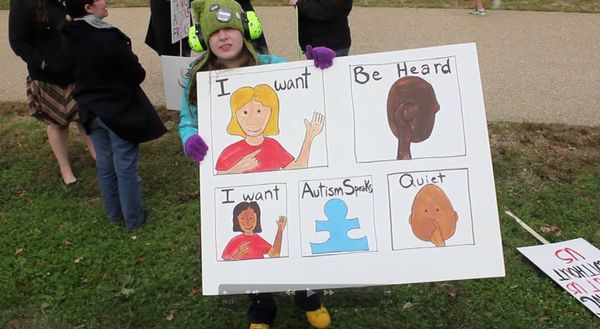Eye For Film >> Movies >> Citizen Autistic (2013) Film Review

Readers elsewhere may not be so familiar with it, but if our US readers try to think of a charity concerned with the issue of autism, most will probably think first of Autism Speaks. With a large budget, a lot of attention from politicians and the media, and television adverts, it has a profile that is nigh impossible for any grassroots advocacy organisation to compete with. Yet Autism Speaks doesn't have a single autistic person on its board. It speaks about autistic people; community activists argue that it has no right to speak for them.
William Davenport's follow-up to Too Sane For This World introduces the activists attempting to challenge Autism Speaks over its political dominance, its exclusion of autistic people, its depiction of autism and its promotion of potentially injurious practices to control autistic behaviour (most notably at the Judge Rotenberg Center, under investigation for allegedly using electric shocks on children). It takes in demonstrations, policy discussions and a number of different individual perspectives delivered in interview. Notably absent is any response from Autism Speaks, but this is apparently not for want of trying on Davenport's part.
Those already familiar with the autistic movement in America will recognise some well known faces here, such as Ari Ne'eman and Zoe Gross, whose presence marks out the significance of the film. For those approaching the subject for the first time, there's a significant learning curve involved, though many aspects of the story will already be familiar - this is hardly the first group to argue "nothing about us without us." One thing that isn't really touched on until quite late is the perceived conflict between 'high functioning' autistic people (those whose difference might not be apparent until they explain it) and those who need a great deal of help to cope with even simple tasks. This is a bit of a problem as, false though the dichotomy may be in many ways ('low functioning' autistic people still have their own opinions and other autistic people are often better placed to understand their needs than neurotypical people are), it is critical to the division between the community's perspective and that of Autism Speaks. The latter treats autism as a disease in need of a cure and, arguably, this is much closer to the truth for those severely affected. The participants here argue very effectively, however, that this approach can lead to the demonisation of affected children. The best antidote to this comes from one mother's descriptions of life with her autistic son, her warmth and joy helping to balance the drier aspect of the film.
For a film dealing with politics, this is overall a surprisingly warm and engaging piece of work. Strong personalities hold viewers' attention and the film shows rather than tells us that autistic people can lead rewarding and successful lives. More to the point, despite the subject matter, those we meet here are people first and autistic second; the latter matters in terms of the expertise it gives them but does not define their destinies. These are not the lonely, wounded, tragic individuals depicted in Autism Speaks films. They're interesting in their own right.
Historically, this film is likely to have considerable value as a snapshot of a movement at a pivotal time in its history. It places the autistic struggle within a wider social justice context, looking at the past pathologisation of gay, disabled and deaf people and considering the ways those groups have made breakthroughs. In the immediate term, it is also important in raising awareness and helping to change people's perceptions. Autism Speaks has probably been wise to ignore it and thereby avoid giving it a wider audience, but it seems likely to achieve a healthy circulation even without that help.
Reviewed on: 13 Oct 2014
















